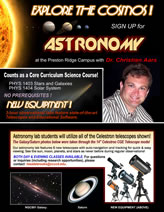|
Welcome to PHYSICS @ Collin College! |
| |
|
|
QUICK LINKS |
|
Astronomy at PRC! |
|
Sign up for Astronomy at the Preston Ridge Campus with Dr. Christian Aars! flyer
For more information contact Dr. Christian Aars at caars@collin.edu |
| |
|
|
 |
 |
|
|
|
|
Six
Reasons Why No Student Should Go
Through College Without Taking Physics: |
| 1. |
Most modern technology came from physics. Any
technology involving electricity, magnetism, mechanics, heat, light,
sound, optics, etc. comes from physics. Even though the basic knowledge
required to discover fertilizers, drugs, plastics, and chemicals comes
from chemistry and in some cases biology, all of these items have
to be manufactured, and manufacturing is dominated by physics-based
technology |
| 2.
|
Most
branches of sciences contain principles obtained from physics.
Like technology, it is hard to find a branch of science which does
not contain some physics-related aspect such as electricity, magnetism,
mechanics, heat, light, sound, optics, etc |
| 3.
|
College
success for virtually all science, computer, engineering, and premedical
majors depends on passing physics. College level physics
is a required course for all of these majors. Engineering is almost
entirely applied physics. Pre-medicine majors are typically required
to take the same number of physics as biology classes! Also, about
25% of the science knowledge required for the MCAT (Medical College
Admission Test) is based on physics. |
| 4. |
Physics classes hone thinking skills.
Physics requires both mathematical and verbal skills. All problems
in physics are word problems which require students to think logically,
use analogies, and deal with subtle shades of meaning. |
| 5. |
The job market for people with skills in physics is strong.
Engineers are applied physicists and comprise the second largest profession
in America with about 1.4 million members. By comparison, there are
about 500 thousand medical doctors and only around 100 thousand biologists.
However, even medical doctors and most biologists have to take college-level
physics courses. |
| 6.
|
A
knowledge of physics is needed to understand music, art, and literature.
Physics is the science which deals with sound. It is impossible to
understand how instruments work or to build a theory of music without
resorting to physics. Einstein, for instance, was an accomplished
violinist. Physics is also the science of light. What could be more
basic to an understanding of art? Leonardo da Vinci was not only a
great artist but also an outstanding physicist. He was one of the
first physicists to develop a wave theory of light. Clearly physicists
have been influenced by literary figures. The physics term quark was
taken from James Joyce and the term boojaums from Lewis Carroll. By
the same token, many commonly used expressions in our everyday language
come from physics. These include quantum leap, free fall, light years,
black holes, resonance, and being on the same wave length. Many authors
have used allusions to physics in their literary works. William Faulkner,
for instance, used the symbolism of time dilation in The Sound and
the Fury. John Updike and a host of other poets have used physics
metaphors in their work. The arts and humanities cannot be fully understood
without some background in physics. |
|







